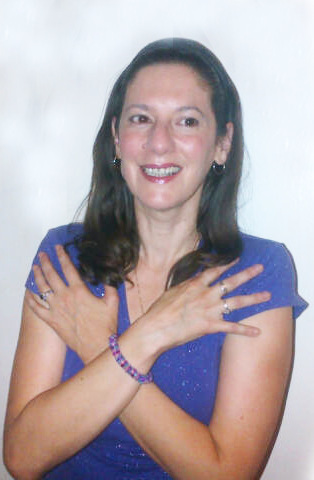By Rev. Francesca Bongiorno Fortunato
At my last job before this one (teaching drama in an after school program) I was “half out.” That’s a phrase I’ve heard many other bisexual people use, referring to what happens when we are in same-gender relationships and allow others to perceive us as gay or lesbian. Being “half out” means that people (at work or other communities) know we’re not straight. But they don’t know we’re bisexual. When they label us as gay or lesbian, we don’t correct them.
I can’t speak for other bisexuals in that position, but my own reason for allowing the misperception was simple enough. My boss and co-workers were all quite conservative straight people, as far as I could tell. I’d had to be honest, during my interview, about being in a same-sex marriage, so there was no hiding that. But I didn’t want to ask for more alienation (and there was already some, based on my marriage to my wife) than I was already experiencing. I could tell that my boss and co-workers (who tended to suddenly stop talking whenever I walked by) considered me an outsider, just for being “not straight.” My thinking was that, by not mentioning my bisexuality, I was allowing people at work to see me as a “respectable, married lesbian.” That seemed to be the safest thing for me, in that environment. I did feel very uncomfortable with my decision because I know that being out as bisexual is important for our community. I wasn’t proud of making the self-preserving (selfish) choice, but I did it anyway.
At my current job (as Interim Director of Religious Education for a Unitarian Universalist church), I am 100% out. When co-workers labeled me as lesbian, based on my marital status, I corrected them and told them about my bi writing and activism. When I was asked to give a sermon on Religious Education Sunday, I mentioned my bisexuality from the pulpit! I was glad to have a workplace that felt safe enough for me to be fully out.
Being an Interim DRE means that I am not allowed to keep this job for longer than two years. My contract with the church will end in June, and I have begun the search for my next job. I certainly hope and pray that it will be one where I can be fully out at work, without risking my job security or emotional safety. But there are no guarantees. Even many “liberals” seem to be unable to respect bisexuals, and there is only so much stigma I’m willing to take on. As a result, I might end up being “half out” again.
During the years when I was married to a man, I was never out at work at all. Being perceived as straight meant that I would have had to really, forcefully out myself not only as “not straight” but as bisexual. And, of course, that might well have led my supervisors or co-workers at those jobs to think I was looking for sex outside my marriage, or just “seeking attention.” I didn’t want to deal with that!
I think it’s harder for us to be out at work than we are in other communities (social circles, school or even family) because our livelihoods are at stake. The risk (of either losing our jobs or being made miserable at them by stigma and harassment) can seem too great. Of course, I doubt that any prospective employer who does a “Google” search on me won’t find out, almost immediately, that I am bisexual. I’ve done so much public bisexual activism and bi writing (including a lot for this publication) that my orientation is pretty much all over the Internet for the whole world to see these days. So, the choice might not even be mine to make the next time. And maybe that’s a good thing. I hope so!
Rev. Francesca Bongiono Fortunato is an ordained minister, dance teacher and bi activist, for whom writing is a serious avocation. She lives in Brooklyn, NY, with her wife, Lynn, and their cats, Alice and Gracie.

